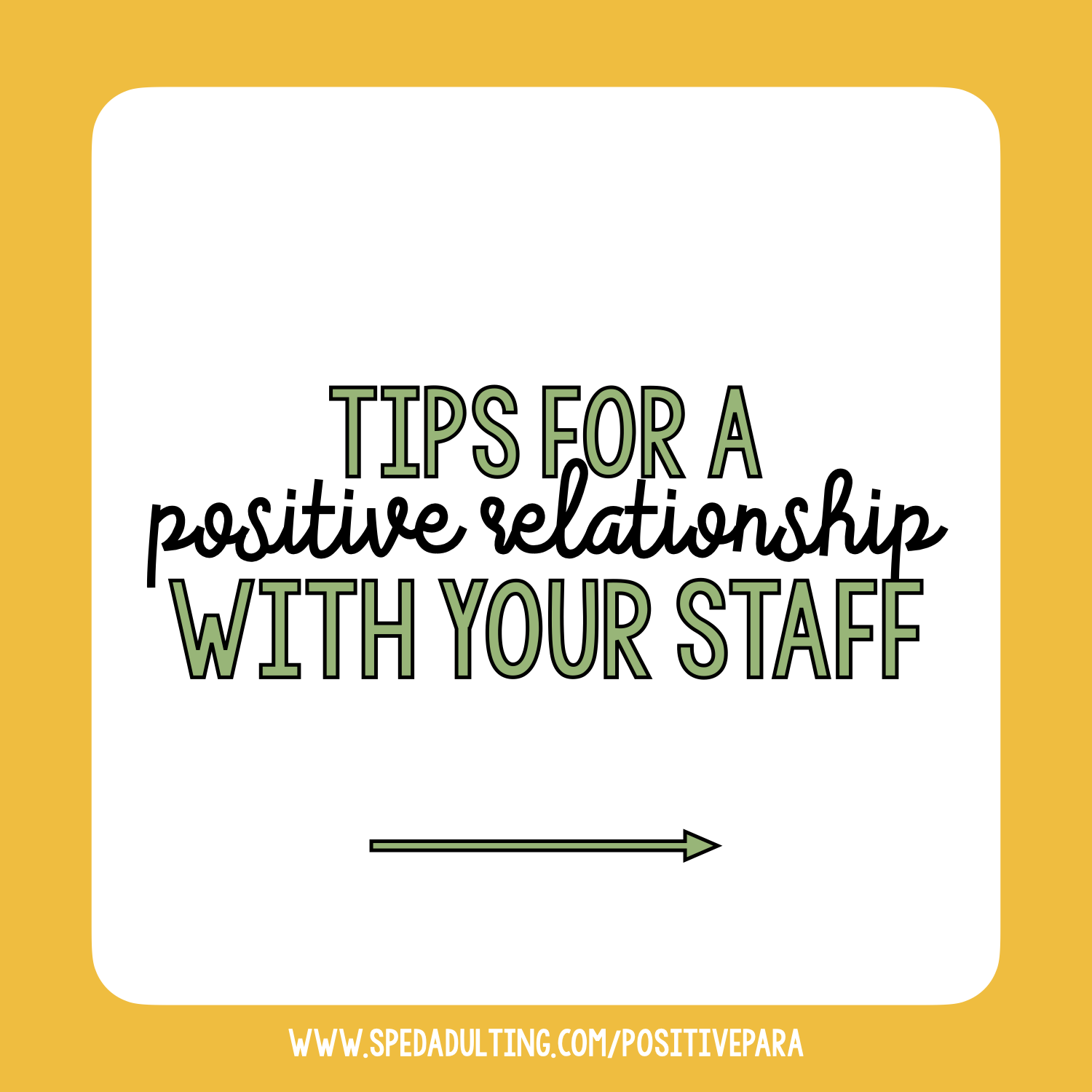One of the main job tasks of being a special education teacher is managing and training paraprofessionals. Some would even say that this is the hardest part of the job. If your staff aren’t doing their duties, or if they don’t respect you, it can lead to more work for you and an unpleasant classroom culture. Whether you are a new teacher or veteran, it’s never too late to implement these tips. Check out how you can build a positive relationship with your paraprofessionals.
1. Fewer/shorter meetings
You probably don’t need weekly meetings and your staff will thank you for this. Let’s be honest, no one likes attending meetings and that time could probably be productively used in better ways. If you hold routine meetings each week because its on your schedule, find ways to consolidate or only hold meetings when something important comes up. If you feel that having weekly meetings is a positive part of your classroom dynamic that is totally fine, just make sure they are straight to the point and team members are having an active part in collaborating (like discussing how to problem solve issues happening in class or specific students).
2. What the meeting about?
If you are meeting with staff, privately or as a group, tell them what you are meeting about before you meet. Don’t leave them guessing or worrying that it might be something bad. Most people want to know ahead of time what to expect. If you are having a meeting to collaborate, this is especially important to let staff know ahead of time so that the can spend some time thinking about what they would like to discus or brainstorm.
3. Dont call staff out
Don’t call a staff out on something negative in front of other staff (step aside & talk privately). Unless of course, it is something that is putting someone in immediate danger. These conversations can be embarrassing and staff could get defensive if you present issues in front of others. You can present these “generic issues” during meetings where no one is a focus point.
4. Positive praise
Give more positive praise than you critique – just like our students, adults need positive praise and support as well.
-
Product on sale
 Job Skills Daily Warm Up Worksheets BUNDLEOriginal price was: $36.00.$30.00Current price is: $30.00.
Job Skills Daily Warm Up Worksheets BUNDLEOriginal price was: $36.00.$30.00Current price is: $30.00. -
 FREE Downtime Ideas Posters for Special Education Classroom$0.00
FREE Downtime Ideas Posters for Special Education Classroom$0.00 -
 FREE Staff Break Schedule Posters$0.00
FREE Staff Break Schedule Posters$0.00
5. Staff input
Listen to/ask for their input about the student(s) they work with. Odds are, they might even know the student better or in ways you don’t see – their input is extremely important. Collaborate with the common goal of the students’ best interest in mind.
6. Are they burnt out?
Be aware of and ask if they need a break or to be switched to work with another student. Avoid burning out your staff, some staff might have too much pride to tell you themselves that they need a break, so be the first to offer it if you notice they might be getting burnt out.
7. Be in their shoes
Don’t ask staff to do something you wouldn’t do yourself. You are part of a team, lead by example.
8. Change your language
Your staff are important to the day-to-day operations of the classroom culture. Use language like “our students” or “our classroom”. Never say things like “they are only paraprofessionals” or “just a staff”. I often refer to my paras as “teachers” to the students. They help assist students with their activities, they help me run my lessons, and so on. They are helping teach the students, there’s no need to be on a power trip or distinguish myself the teacher as anything higher when we are all doing learning activities with the common goal of assisting the student in learning.
9. Designate space for staff
As a teacher, you get your own desk, computer, and an area to put your teacher bag. Your staff have personal belongings too. At the least, designate a coat rack or cabinet for staff to put their belongings. It’s little things like this that help go a long way.
10. Thank your staff
Paraprofessionals do A LOT. They don’t nearly get paid enough for what they deserve. Without them, your class could not function safely or just literally. Buying them lunch here and there or coffee is a great way to say thank you. Those costs can add up quickly and not all of us may have the means to pay for extra things like that, so even a simple “thank you” goes a long way -and say it often.
Thanks for reading!





